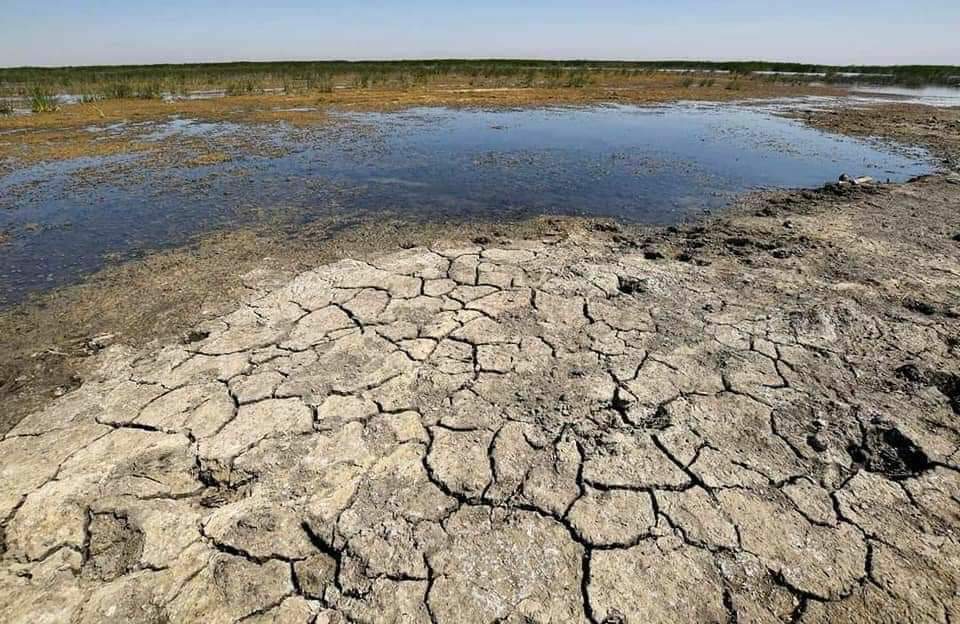INSUBCONTINENT EXCLUSIVE:
Shafaq News/ The Deputy Special Representative of the UN Secretary-General, Resident and Humanitarian Coordinator for Iraq, Resident and
Humanitarian Coordinator for Iraq, said that climate change is the "biggest threat Iraq has ever faced," stressing that there is still hope
to turn "things around."Ghulam Mohammad Isaczai said, "when I traveled to Baghdad a month ago to assume my duties in Iraq to help coordinate
our support to the government and people in need, the land of the two rivers was totally different from what I had seen two decades ago when
Dust filled the air, kicked up by hot winds
Swathes of arid land dotted by stubborn palm trees patiently struggling to withstand the elements of nature
This is not the Mesopotamia as described in the history books, the land of civilizations
When I asked Iraqis and others who have been here for many years, I was told it was never like this before
Clearly, climate change has taken its toll on this country."The Deputy Special Representative for Iraq considered the effects of climate
change "dramatic.""This beautiful and fertile land, known throughout history for civilizations sprouting around the mighty rivers Tigris and
Euphrates, now stands on the frontline of a global climate crisis as the world's 5th most vulnerable country." Still, "There is hope to turn
things around, and it is for Iraqis to take the lead."He added that the 27th UN Climate Change Conference – COP27 – proceeding in full
swing in Sharm El Sheikh, Egypt, needs to look at environmental issues and challenges in Iraq and what needs to be done about them
"COP 27 is an important opportunity for world governments to stick to and further develop their climate commitments (Nationally Determined
Contributions) while transferring the climate change spirit and awareness back to Iraq."Isaczai listed the main environmental problems in
Iraq: extreme weather events and changes in climate patterns such as heat waves, heavy rains, rising temperatures and increased variability
and unpredictability of rainfall; sand and dust storms; prolonged droughts; land degradation; flash floods; and water scarcity.The top UN
humanitarian official described how the situation get worse in the country
"In 2021, Iraq experienced its second driest season in 40 years due to record low rainfall
Over the last 40 years, water flows from the Euphrates and Tigris, which provide up to 98% of Iraq's surface water, have decreased by 30-40
The historic marshlands in the south, a natural heritage wonder, are drying up
Iraq's temperatures are soaring, with the highest of nearly 54°C recorded in Basra
Low river water means seawater is pushing into southern lands, with salination threatening agriculture
The livelihood and even existence of entire communities are at stake.""Climate change in Iraq affects Iraq's agricultural sector and is a
severe threat to fundamental human rights, creates barriers to sustainable development, and worsens the country's environmental, security,
political, and economic challenges.""We must act now and start moving towards a climate-resilient economy while equally addressing
adaptation and mitigation
We all have a responsibility to safeguard our collective future and work together towards the greater good," he added.Isaczai suggested that
every Iraqi can begin by taking concrete steps at home
"Each person needs to make better and more responsible choices, whether it's through what they eat, how they travel, how they conserve water
and electricity, and what they buy.""Managing water resources will require both diplomacy and tackling Iraq's own water pollution and
Hence, no waste by running taps, excessive use for gardening, and polluting the rivers and streams.""Iraq needs to modernize and expand
water treatment plants, repair outdated and damaged water infrastructure, enforce water use limits, and invest in new irrigation
infrastructure, water harvesting, and promote innovative irrigation practices
Dialogue and engagement with neighboring countries to ensure a fair share of water is critical.""Utilizing solar energy, cost-effective and
abundant from the powerful sunrays throughout most of the year, and improving energy efficiency by reaching zero gas flaring as well as
simultaneously building up renewables, such as wind and hydro, will certainly help reduce toxic emissions and cost." He
suggested."Campaigning for the environment, promoting large-scale recycling and other sound environmental practices, involving the youth who
make up more than half of Iraq's population in climate-related matters from early life, guarantee the success of any efforts to save our
planet."He also highlighted the necessity of "public advocacy and accountability "to encourage private local and international investment to
enable green start-ups in the agriculture, waste, and energy sectors."There is still time to turn things around
With climate action backed by Iraq's leaders and people, we have a real opportunity to leave a better Iraq for our next generation
I am encouraged that as well as joining the Paris Agreement, Iraq is pioneering its Green Paper, enshrining climate adaptation in policy."
Isaczai said.He concluded by expressing the United Nations' readiness to help the new Government of Iraq to deliver on its climate
commitments through tangible actions and implementation, coordinated solutions, and engagement at all levels.

